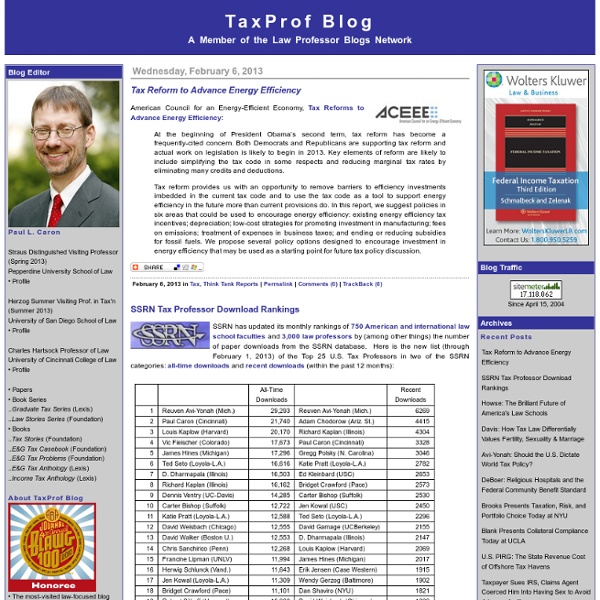



Blog Index « Roth & Company, P.C Not a firm foundation. A U.S. District Court case out of Texas last week shows why using a tax-exempt entity can be hazardous to your health. A Mr. Ziegenhals was “manager, director, trustee, and registered agent” of The Le Tulle Foundation, which was “formed in 1991 as a testamentary trust with the stated purpose of operating ‘exclusively for charitable purposes for the benefit of the citizens of Matagorda County, Texas [and] for no other purposes.’” Crime and Consequences Blog Cutting and pasting from his last 3000 speeches, Attorney General Holder testified today before the House Judiciary Committee. He repeated his standard lines in favor of cutting by half the minimum required sentences for drug dealers -- which, of course, he never actually identifies as "cutting by half the minimum required sentences for drug dealers." Instead, he talks in roundabout language designed to obscure what's actually going on. Thus, he uses the always-a-good-tipoff set of phrases like "evidence-based," "commonsense change," and "tough and smart." For right now, I want to highlight one thing Holder said that's simply not so. He stated (prudently tucked into his eighth paragraph) that the Smarter Sentencing Act "would give judges more discretion in determining appropriate sentences for people convicted of certain federal drug crimes."
Wills, Trusts & Estates Prof Blog Monday, April 14, 2014 Is It Hard to Find Your Documents? Your estate planning efforts may be wasted if your family can’t find your documents. Here are some tips to ensure your documents are readily accessible when the time comes: Taxing Lessons Newsletter - April 30, 2011 These are archived issues of Taxing Lessons, the newsletter that condenses selected US Tax Court opinions into interesting, informative summaries--and lets you be the judge. For current case studies, click here Share the fun! You may re-distribute Taxing Lessons as long as the entire newsletter is left intact. Please respect our copyrights. FP Legal Post A move to close a discipline hearing into two lawyers who used to represent Conrad Black and his related companies is turning into a “waiver bandwagon,” as key companies indicate a willingness to forgo their right to solicitor-client privilege over critical legal documents that would allow the hearings to be held in public. “We want an open hearing,” stressed Phil Campbell, who represents Beth DeMerchant, at the Law Society of Upper Canada hearing. “There’s been a recent flurry of activity in the direction of waiver,” he told the three-member discipline panel on Thursday. Ms.
Planning Notes: Estate Planning, Business, Real Estate, & Tax Blog Via this blog we address fundamental concepts and issues relevant to estate planning law (will, trust, probate, asset protection), business law (LLC), real estate law, & tax law. Published by Douglas K. Cook & Steven W. Cook. IRS: Bitcoin is Property, Not Currency Romney's CRUT Tax Shelter The Bloomberg press has looked further at Romney's use of trusts and other arrangements to avoid taxes, using Freedom of INformation Act requests to obtain more information than was released by Romney in his meager tax return release. Romney established a charitable trust in 1996 of a type that Congress cracked down on in 1997 (regrettably, a crackdown that grandfathered existing arrangements, which is the way so many rich people get to keep using abusive shelters). See Jesse Drucker, Romney Avoids Taxeds via Loophole Cutting Mormon Donations, Bloomberg.com (Oct. 29, 2012).
Bench Memos The IRS and its defenders in Halbig v. Sebelius, one of several cases challenging IRS’s interpretation of the Affordable Care Act, have raised questions about whether Congress really meant to deny tax subsidies to taxpayers if their states didn’t set up insurance exchanges. As we shall see, this was one of several mechanisms to “encourage” states to set up exchanges by threatening their residents with the loss of benefits if they didn’t join the party. Legal Writing Prof Blog Thursday, April 17, 2014 Shall we eliminate "shall"? Lawyers are often told that the word shall is prescriptive, meaning that something is required. But as NKU Chase Professor Phillip Sparks pointed out in a recent Kentucky Bench and Bar column, shall can actually have several meanings and may be more confusing than helpful. Sparkes points out that England, Scotland, Australia, and New Zealand have largely eliminated shall from legal writing.
Third Annual ABA Journal Blawg 100 - Magazine Cover Story Posted Dec 02, 2009 05:50 am CST By Molly McDonough News The Legal Whiteboard Last fall, while making a presentation at the Midwest Association of Pre-Law Advisors Conference in St. Louis, I had the opportunity to respond to the question that is the title of this blog posting. Is the employment market for law graduates going to be improving? My answer was, and is, almost certainly yes, although perhaps not immediately. I write this to offer my perspective on the employment market for law graduates in the coming years. A number of people have written on this topic in recent weeks and months.